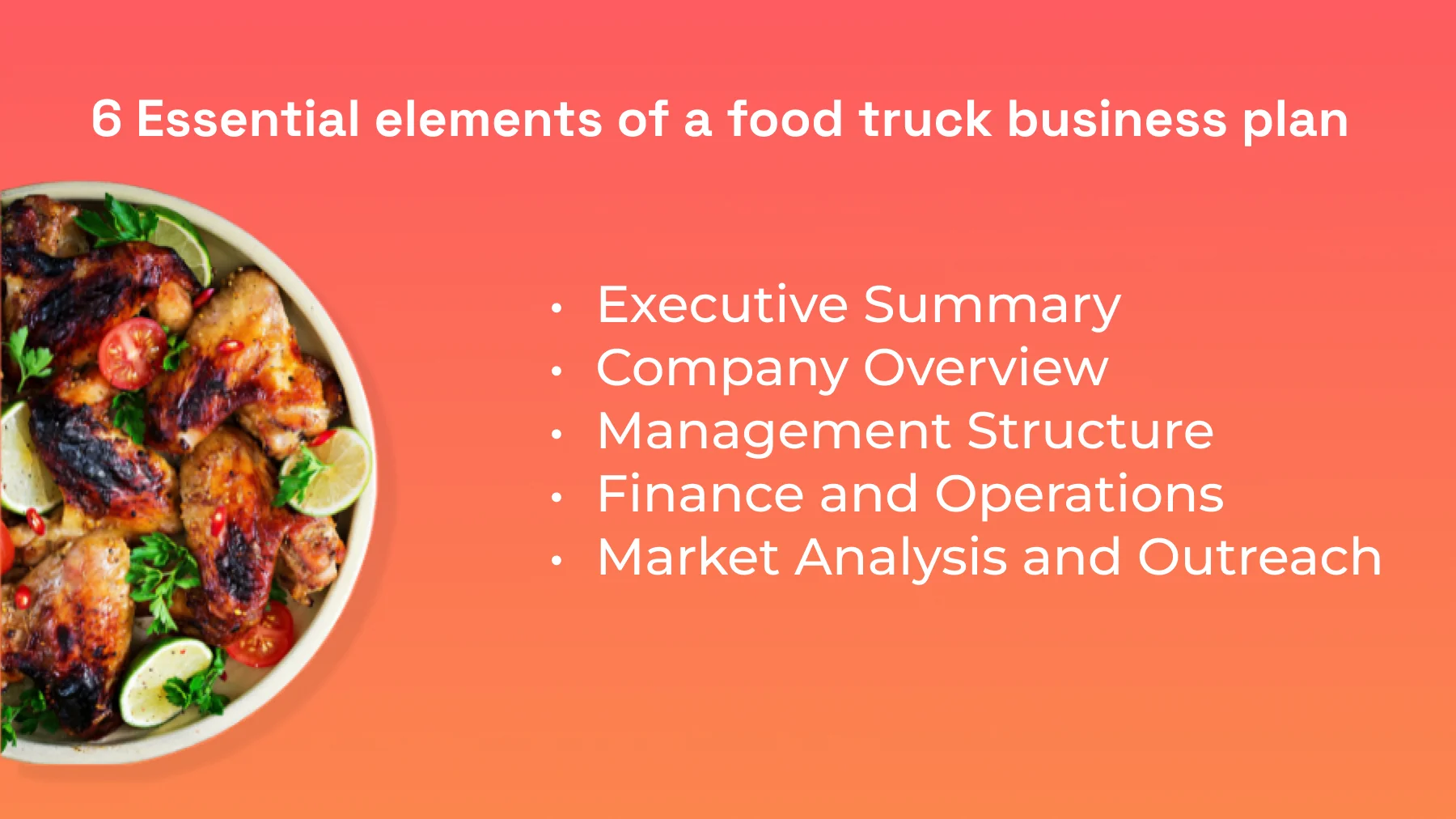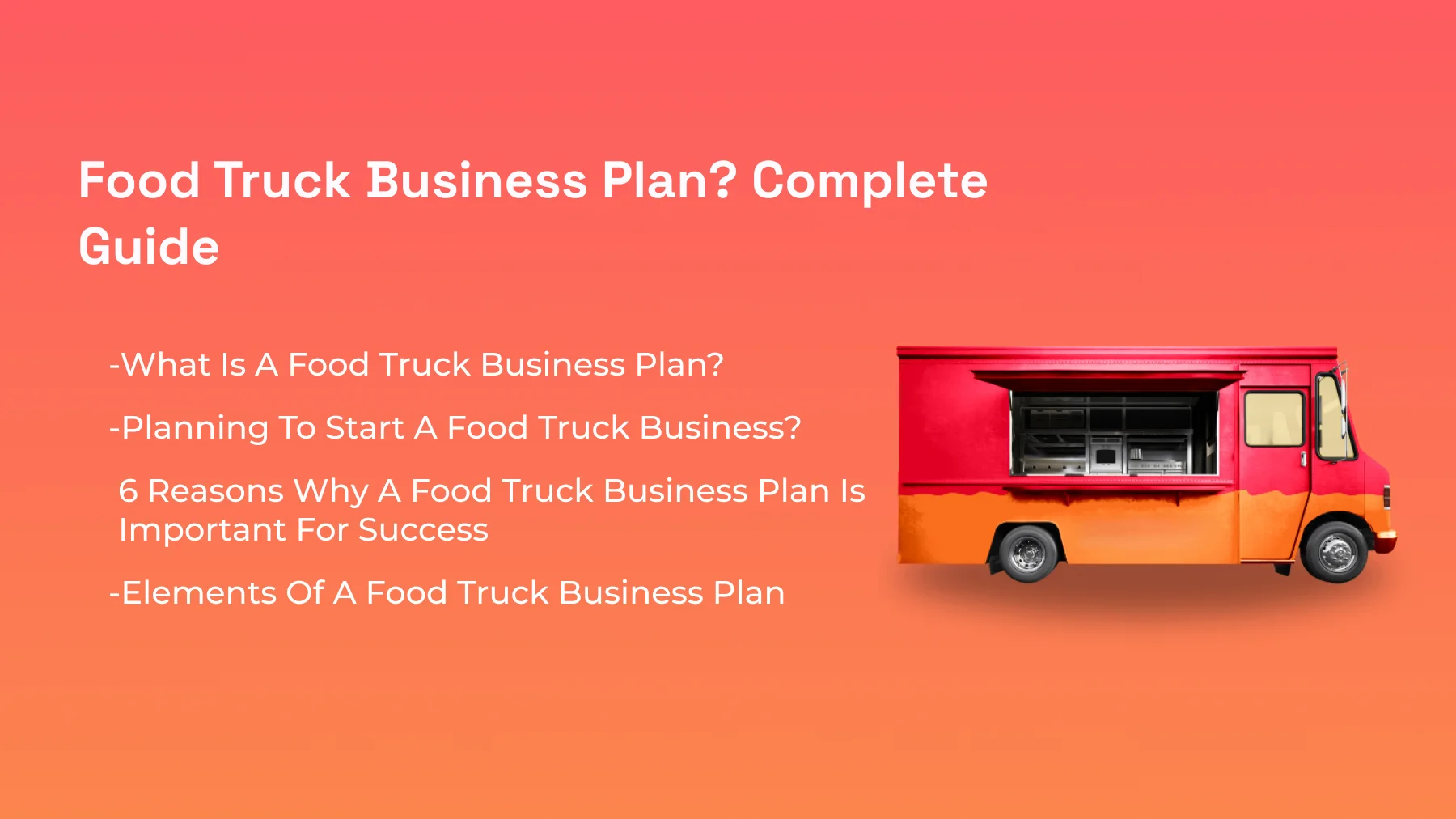How to Create Food Truck Business Plan? Complete Guide
A food truck business is a great way to venture into the world of street food. Unlike a conventional brick-and-mortar restaurant, it offers great flexibility to reach out to a diverse set of customers from a variety of locations.
The food truck business model has witnessed stupendous growth during the past few years due to several reasons. It provides convenience of food on the go and is ideal for people following a mobile lifestyle. It is the choice of first-time entrepreneurs as it is a low-investment, low-risk option in the restaurant industry. The influence of consumerism and the growing preference for eating outside has led to the growth of the food truck business.

A food truck business plan is a comprehensive document outlining the business goals, strategies and operational processes for goal achievement. It is a blueprint that details all the elements needed for the success of the business venture.
Planning To Start A Food Truck Business?
A food truck business is just like any other profitable business. Running it successfully requires diligent planning and strategizing. Some operational challenges include figuring out fuel and power, securing necessary parking permits and cooking and serving in a compact space. But all these challenges can be overcome efficiently with a robust food truck business plan.
A solid food truck business plan functions as the roadmap to your success by highlighting the complexities of the market and showing you the best way to navigate through them.
A well-planned, well-thought and well-executed business plan distinctly outlines the business goals, defines the target audience and operational strategies. A robust business plan helps build trust and is, therefore, a compelling tool for securing funding. A handy business plan template also helps entrepreneurs take notes or jot down brilliant ideas as and when they occur. The truck operations – from everyday tasks to year-end paperwork will run more smoothly if the food truck owner uses the detailed business plan as a north star.

This blog will help you gain better insights into the process of writing a comprehensive food truck business plan.
Before getting into the intricacies of drafting a food truck business plan, let us first understand the reasons why a food truck is becoming an attractive alternative to opening a restaurant.
6 Reasons Why A Food Truck Business Plan Is Important For Success
1) Depicts Focus
A formal food truck business plan shows all the stakeholders that you have an unswerving focus on brand building. It is an indication that you are a visionary leader and an invitation for others to join your ambitious project.
2) Determines Financial Needs
Starting a food truck might involve lesser cost than opening a conventional restaurant. But they have a very high rate of failure. It is, therefore, important to consider various cost factors like food costs, payroll, fuel, power and taxes that drain the business rapidly. The business plan brings the start-up cost, projected sales and the annual budget to paper, helping to determine the capital amount precisely.
3) Understand Competition
The process of creating a food truck business plan involves evaluating the competitors. This will help avoid risks from direct and indirect competitors. While conducting research to draft the business plan, if you discover that a few other food trucks operating in the same radius share the same concept as you, you can make necessary changes before it causes harm to your brand.
4) Understand Customers
Customer analysis forms a vital part of the food truck business plan. It helps you understand the demographics and psychology of your customers. You get to know the products that your target audience buys, the places they buy from and their purchase motives. The analysis also throws light on what they do not buy, the reason behind their dislike for certain products or places, and so on.
5) Evaluate Concept Feasibility
When you draft a proper food truck business plan, you educate yourself on the target market and the competition. This is like a feasibility study that helps you foresee survival and success rate of the business.
6) Discover New Opportunities
It takes solid brainstorming to draft a flawless food truck business plan. During this process, you will get a completely different perspective of your business that will, subsequently, lead to the generation of new ideas and strategies.
Elements Of A Food Truck Business Plan
A food truck business plan provides great clarity to first time restaurateurs and food entrepreneurs. This document outlines the culinary vision and contains specific details about the way the owner intends to achieve it.
A reliable, professional food truck business plan contains the following elements. These elements are essential to stay focused while navigating the intricacies of the food truck business. When the plan encompasses these vital elements, the potential investors can understand the viability of the venture
- Executive Summary
- Company Overview
- Management Structure
- Finance and Operations
- Market Analysis and Outreach

I) Executive Summary
A solid executive summary functions as the foundation of the business plan. It is like the resume of the food truck providing a concise overview of how your concept and business is unique.
The executive summary aims to provide a high-level overview of aspects like:
- Menu Offerings
- Target Audience
- Intended location
- Business mission
- Core Values
- Financial projections
- Profits
How To Write An Effective Executive Summary?
- Describe the menu and the inspiration that helped design it
- Explain the gap in the market that you wish to fill
- Vividly elucidate the offerings and their value proposition
You might decide to offer fusion cuisine by blending the flavors of diverse culinary cultures or simply serve family recipes handed down through generations. This executive summary will increase the interest of potential investors and make them want to know more.
II) Company Overview
Your business plan tells stakeholders about what your food truck represents. While the function of the executive summary is to catch the attention of the reader, the company overview performs the function of exploring and divulging the details.
It is good to ask yourself the following questions while preparing the company overview.
- What are the advantages that I am going to enjoy by opting for a food truck instead of a conventional restaurant?
- What is the type of mobile kitchen that can be operated with ease? Will it be a food truck, trailer or food cart?
- Will all the food preparation take place inside the food truck, or will I adopt the ghost kitchen model?
The company overview helps highlight specific menu offerings and the key milestones that the business wishes to accomplish with details of the time frame. If you have already acquired any relevant business license or equipment, you can mention details about it in this section.
III) Management Structure
The overall success of a food truck is determined by the people who take charge of the grills and write down orders. Whether your food truck business is going to be a one-man show or run by an expansive crew, list the details of the expertise and individual skills that the management will bring to customer’s tables. This includes prior work experience and education of the members and the name of the positions they will occupy.
Asking the following questions will help you gain greater clarity while creating the management structure.
- Who will take care of the operations and management of the food truck?
- What are the operating shifts of the key management members?
- What are the peak hours of the business when additional help is required?
Determine the company ownership with the exact percentages in writing. This gives a concrete form to the hierarchy and throws light on licensing and tax information.
IV) Financial Plan
This section of the food truck business plan possesses details of the financial anatomy of the venture. List out every element of the initial investment like truck cost, equipment and starting inventory.
You must also list details of ongoing or recurring operational expenses like ingredients, fuel, permits & licenses, food truck insurance and marketing endeavors. Listing these points is mandatory particularly if you are seeking external funding like a startup loan. Make clear mentions of the amount required, explain how it will be spent and tell stakeholders the terms for repayment as well.
With thorough market research, you will also be able to estimate the potential profitability of the venture. Calculate profits for the upcoming five years and mention details in the financial plan section. In this section, it is very important to highlight the benefits to investors. Elaborate on the lucrative potential of the food truck business. Back it up with solid financial projections and a robust plan for sustainability and profitability.
V) Operations Plan
This section is meant to offer a behind-the-scenes look into the working model of the food truck business. This part must have elaborate details of how you plan to run the food truck including details of:
- How are the ingredients going to be sourced and food prepared?
- Details of the suppliers and vendors
- Information of the various locations in which the truck will be stationed
- Adherence to health and safety regulations
This part helps you identify gaps, if any, in your future daily routine. It prepares you to establish efficient processes to serve customers, address challenges like poor weather or equipment malfunction. In this section, you can explain your plans to overcome such contingencies.
IV) Market Analysis And Outreach
This process must be started by defining the target audience. Do your customers consist of office workers looking for a quick bite on the go, are they festive goers seeking culinary specialties and so on. Make use of demographic data to build profiles for ideal customers and mention them in this section of the food truck business plan.
Studying the competition gives great insights into the food truck arena in your intended radius. Study the audience demographic that your competition is already targeting, their strengths and weaknesses in their menu and marketing strategies.
This analysis helps you in formulating your own unique marketing efforts. Describe the specific strategies you have planned to reach out to and retain your target audience.
Your marketing strategies should include:
- Social media posts
- SEO-optimized websites
- Professionally designed logos and branding
- Using third-party food delivery services and apps like DoorDash, GrunHub, etc.
Make use of broader marketing strokes as well. Vividly explain your overall growth plans like hiring extra staff, acquiring additional food trucks or widening the area within which you serve. Including data-driven strategies gives you a distinct roadmap to follow once your business starts operating. Your investors will also be convinced that you are well-prepared to fill the market niche that others have either not even noticed or occupied successfully.
This blog would have helped you understand the nuances of writing a food truck business plan. For more assistance with the food industry and digital marketing strategies for restaurants, get in touch.
KEY TAKEAWAYS!

